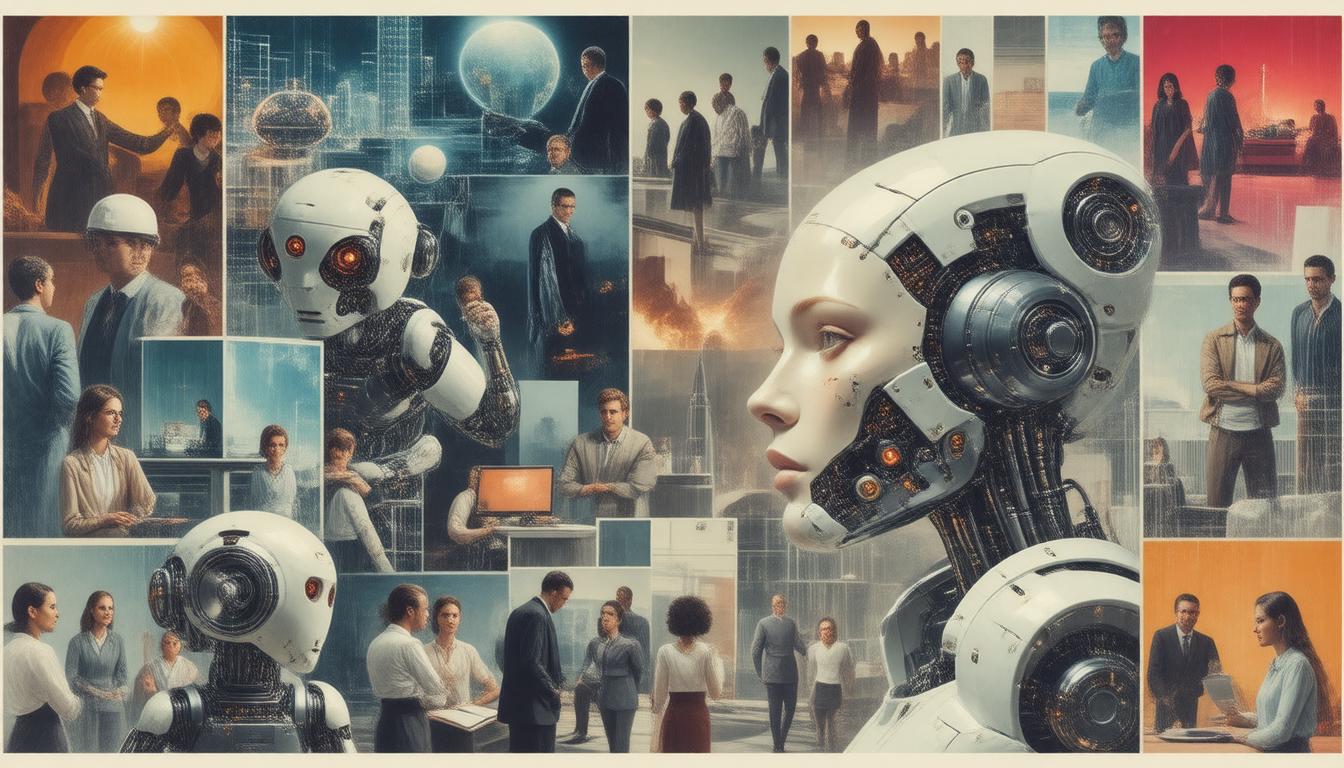In an era defined by rapid technological advancement, the phrase ‘Unlocking Potential: The Power of AI Innovation Across Industries’ encapsulates the transformative impact artificial intelligence (AI) has on various sectors. From revolutionizing healthcare to reshaping business operations, AI’s prowess is evident as it redefines possibilities and enhances efficiency. As organizations adopt AI strategies, they uncover new pathways for growth and innovation, effectively unlocking their full potential. In this article, we will explore the multifaceted applications of AI in healthcare, business, education, and sustainability, alongside the challenges and ethical considerations that accompany its adoption.
Key Takeaways
- AI innovation is transforming various industries by unlocking new potentials.
- In healthcare, AI enhances diagnosis accuracy and personalizes patient care.
- Businesses are streamlining operations and improving efficiency through AI integration.
- AI is reshaping education by enabling personalized learning experiences and accessibility.
- Addressing ethical challenges is essential for the responsible adoption of AI technologies.
Introduction to AI Innovation
In today’s rapidly evolving technological landscape, unlocking potential through the power of AI innovation across industries has become a driving force for businesses aiming to enhance efficiency, creativity, and growth. Artificial Intelligence (AI) refers to the simulation of human intelligence processes by machines, especially computer systems. This transformative technology is revolutionizing sectors such as healthcare, finance, manufacturing, and retail by automating processes, improving decision-making, and enabling personalized customer experiences. Companies leveraging AI not only optimize their operations but also unlock new avenues for revenue generation and strategic development. As more organizations recognize the significance of AI, they are investing in innovative solutions that integrate machine learning, natural language processing, and robotics, ultimately leading to a competitive edge in their respective markets. The potential of AI is vast, and understanding its implications and applications is essential for those looking to thrive in an increasingly digital world.
The Impact of AI on Healthcare
The healthcare sector is experiencing a transformative shift, largely fueled by the rapid advancements in artificial intelligence (AI). Unlocking potential: the power of AI innovation across industries highlights how this technology is revolutionizing patient care, diagnosis, and treatment processes. From predictive analytics that help in early disease detection to AI-driven tools that assist healthcare providers in making informed decisions, the impact of AI on healthcare is profound. For instance, algorithms can analyze vast amounts of medical data, aiding in identifying patterns that may go unnoticed by human eyes. This capability not only enhances the accuracy of diagnoses but also facilitates personalized treatment plans tailored to individual patient needs. Moreover, AI innovations streamline administrative tasks, reducing the burden on healthcare staff and allowing them to focus more on patient interactions. As the healthcare industry embraces these advancements, the potential for improved outcomes, increased efficiency, and reduced costs becomes increasingly apparent, underscoring the necessity of integrating AI into everyday medical practices.
‘The greatest danger in times of turbulence is not the turbulence; it is to act with yesterday’s logic.’ – Peter Drucker
Transforming Business Operations with AI
Artificial Intelligence (AI) is rapidly changing the landscape of business operations, enabling companies to streamline processes, enhance productivity, and drive innovation. By unlocking potential through advanced analytics, machine learning, and automation, businesses across various industries are reaping the benefits of AI innovation. For instance, in the healthcare sector, AI algorithms can analyze vast amounts of data to assist in diagnostics, while in logistics, AI optimizes supply chain management and inventory control. Moreover, the retail industry leverages AI for personalized customer experiences, predicting consumer behavior, and managing stock levels based on real-time data. As organizations adopt these technologies, they not only improve operational efficiency but also gain a competitive edge in their respective markets. The transformational impact of AI is evident, paving the way for smarter business strategies and sustainable growth, making it an essential consideration for modern enterprises.
AI in Education: A New Learning Paradigm
As we witness the dawn of a new era in education, the integration of artificial intelligence is fundamentally transforming the way students learn and educators teach. Unlocking potential is no longer just a hopeful phrase; it’s now a reality made possible by AI innovation across industries, including education. AI tools, like personalized learning systems, adaptive assessments, and intelligent tutoring systems, enable a tailored educational experience that caters to the individual needs of each student. These advancements provide educators with invaluable insights, allowing them to identify learning gaps and optimize instruction. Additionally, AI technologies can streamline administrative tasks, thereby freeing up educators to focus more on teaching rather than bureaucracy. The potential of AI in education is vast, as it fosters a more engaging and effective learning environment, helping students reach their full potential and preparing them for a future rife with opportunities.
Sustainability and AI: A Greener Future
In today’s rapidly evolving landscape, the intersection of sustainability and artificial intelligence (AI) presents a transformative opportunity for industries worldwide. By unlocking potential through AI innovation, various sectors can enhance their efficiency while significantly reducing their environmental footprint. For instance, in agriculture, AI-driven analytics are enabling farmers to optimize water usage and increase crop yields, demonstrating how technology can directly contribute to sustainable practices. Similarly, in manufacturing and logistics, AI algorithms streamline supply chains, minimize waste, and predict demand more accurately, thus fostering a more sustainable approach to production and distribution. As we explore the power of AI innovation across industries, it becomes clear that these advanced technologies not only drive economic growth but also pave the way for a greener future, aligning business practices with global sustainability goals.
Challenges and Ethical Considerations in AI Adoption
As industries increasingly embrace AI technology, unlocking potential is at the forefront of discussions surrounding the power of AI innovation across industries. However, the journey towards successful AI adoption is fraught with challenges and ethical considerations that must be addressed. One significant hurdle is the need for high-quality, unbiased data, as the effectiveness of AI heavily relies on the data it is trained on. Furthermore, organizations must navigate compliance with privacy regulations and ensure transparent algorithms to mitigate discrimination. Ethical implications extend to job displacement concerns, highlighting the need for a balanced approach to workforce transitions. By understanding these challenges, businesses can forge a path forward that not only harnesses AI’s capabilities but also upholds ethical integrity, ensuring that innovation leads to a more equitable and efficient future.
Frequently Asked Questions
What is AI innovation and why is it important?
AI innovation refers to the development and implementation of artificial intelligence technologies to enhance processes, improve decision-making, and unlock new opportunities across various industries. It’s important because it can drive efficiency, increase productivity, and foster groundbreaking solutions to complex problems.
How does AI impact the healthcare industry?
AI is transforming healthcare by enabling more accurate diagnoses, personalizing patient care, improving drug discovery processes, and streamlining administrative tasks. This leads to better patient outcomes and reduced operational costs.
In what ways can AI enhance business operations?
AI can enhance business operations through automation of repetitive tasks, data analysis for informed decision-making, customer service improvements via chatbots, and supply chain optimization. This results in increased efficiency and reduced costs.
What role does AI play in education?
AI in education facilitates personalized learning experiences, automates administrative tasks, provides data-driven insights for educators, and offers adaptive learning technologies that cater to individual student needs, fostering a more effective learning environment.
What are some ethical considerations in AI adoption?
Ethical considerations in AI adoption include issues related to bias in algorithms, data privacy concerns, the need for transparency in AI decision-making processes, and the impact of automation on employment. Addressing these challenges is crucial for responsible AI development.




